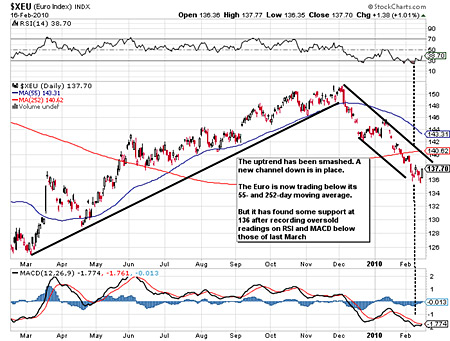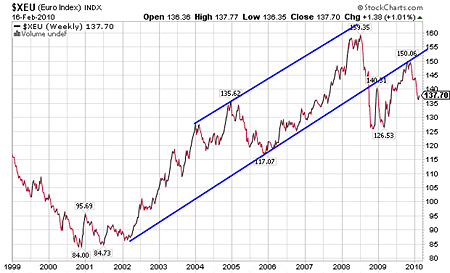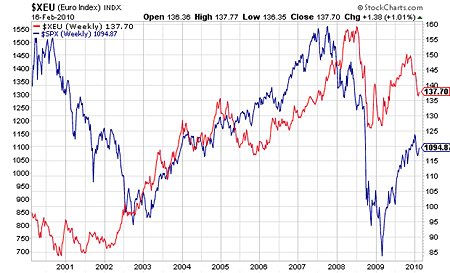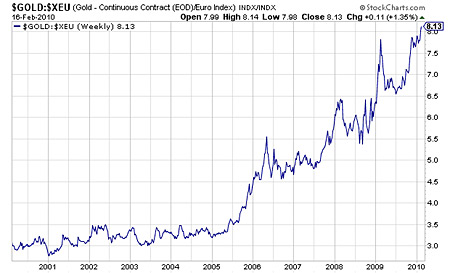The euro's plunge shows why you should hold gold
The euro has taken such a battering recently that its very future is being questioned. And it's not just the euro that's in trouble, as governments abandon any sense of fiscal responsibility. That's all the more reason to stock up on gold, says Dominic Frisby.
Get the latest financial news, insights and expert analysis from our award-winning MoneyWeek team, to help you understand what really matters when it comes to your finances.
You are now subscribed
Your newsletter sign-up was successful
Want to add more newsletters?

Twice daily
MoneyWeek
Get the latest financial news, insights and expert analysis from our award-winning MoneyWeek team, to help you understand what really matters when it comes to your finances.

Four times a week
Look After My Bills
Sign up to our free money-saving newsletter, filled with the latest news and expert advice to help you find the best tips and deals for managing your bills. Start saving today!
It's quite astonishing how quickly sentiment can change.
In early December, the euro was trading at all-time highs against the US dollar, somewhere north of $1.50. Across the continent, be it in Rome, Frankfurt or Paris, US nationals were seen to wince each time they reached into their wallets. Meanwhile German exporters grumbled about their lack of competitiveness.
Yet barely two months later, the euro has fallen by 10% or more. The sustainability of the currency has been called into question. Talk of the break-up of the eurozone is prevalent. And by Friday, short positions (people betting it will fall) against the euro on US futures exchanges had risen to $47.6 billion, the largest ever recorded net short position.
MoneyWeek
Subscribe to MoneyWeek today and get your first six magazine issues absolutely FREE

Sign up to Money Morning
Don't miss the latest investment and personal finances news, market analysis, plus money-saving tips with our free twice-daily newsletter
Don't miss the latest investment and personal finances news, market analysis, plus money-saving tips with our free twice-daily newsletter
So in today's Money Morning, I want to take a look at the euro...
Any euro rally will be short-lived
When you hear that something has the 'largest-ever short position' recorded against it, that immediately makes you want to take the other side of the trade.
And in the short term, various technical indicators such as the RSI (Relative Strength Index) and MACD (Moving Average Convergence/Divergence) I'll explain the details of what they are another time suggest the euro is vastly oversold and due a bounce. Nevertheless, I would venture that any rally will be little more than temporary respite. Perhaps we will move to just above $1.40.
The up-trend that's been in place since last March has been smashed. We are already trading below long-term moving averages. A new downtrend is in place, as the thick black lines on the chart below show. (I've included notes on the moving averages for those who are interested. But even if you're not into technical analysis, it's pretty obvious that the euro is currently heading downhill fast).

[click on the chart for a larger version]
Greece makes up just 2.6% of the entire eurozone's GDP. If it can threaten the currency and its banking system by running a 12.7% of GDP budget deficit, what damage might Spain do? She is running a marginally lower budget deficit of 11.2% of GDP. But she makes up almost 12% of the eurozone's GDP six times higher than Greece. Then there's France (which makes up over 21% of eurozone GDP), looking positively prudent in comparison, with her deficit of 'just' 8.3% of GBP. Yet the eurozone deficit limit is supposed to be 3%!
Only Germany appears to be showing anything like fiscal sanity.

- Why UK property prices are going to fall 50%
- When it will be time to get back in and buy up half price property
With these kinds of problems, any bounce is bound to be short-lived. If we take a look at a long-term chart of the euro vs the US dollar since 1999, you can see how far this thing potentially has to fall, now that the long-term up-trend has been broken (in mid-2008). There is support at $1.35 and beneath that around $1.25. But if $1.17 doesn't hold, the euro could pretty quickly find itself back at parity with the US dollar.

[click on the chart for a larger version]
What the euro can tell us about the US stock market
This next chart shows the euro (red line) against the US stock market (S&P 500 - blue line). It's interesting how since 2003 the two have, largely speaking, risen and fallen together. A rise in the euro often tells us that a rise in the stock market is coming. Similarly, falls in the euro suggest that dark times may well be ahead for the stock markets.

[click on the chart for a larger version]
Hold on to gold - sterling's turn for a fall will come
But those in the eurozone who bought gold will be happy. Gold had a huge day yesterday. It rose some $25. Yet it's still almost $100 below its all-time dollar high of $1,216, recorded last December.
But if you measure gold in euros (see chart below), the yellow metal has broken out to all-time highs and now costs more than €800 an ounce.

[click on the chart for a larger version]
I am forever saying that gold should be viewed not as a commodity but as another currency. Given the stress in the eurozone, is it any wonder that gold has been rising against the euro? I am also forever saying we are too obsessed with the price of gold in US dollars, when it is the price of gold in our own currencies that is important. Gold is your hedge against the fiscal irresponsibility of your own government.
Those Greek (and Spanish and Portuguese and Italian etc) budget deficits that so threaten the euro are not so different from our own. Or indeed from those of our American cousins. For now it is the euro that has the limelight. But I have little doubt that sterling's turn will come.
Our recommended article for today
Cash in onthis commodity's coming price spike
One commodity has been in an up-trend for the last year. But conditions are ripe for a buying frenzy leading to a massiveprice-spike, says Frank Hemsley. Here, he explains why - and how you can cash in.
Get the latest financial news, insights and expert analysis from our award-winning MoneyWeek team, to help you understand what really matters when it comes to your finances.
MoneyWeek is written by a team of experienced and award-winning journalists, plus expert columnists. As well as daily digital news and features, MoneyWeek also publishes a weekly magazine, covering investing and personal finance. From share tips, pensions, gold to practical investment tips - we provide a round-up to help you make money and keep it.
-
 Can mining stocks deliver golden gains?
Can mining stocks deliver golden gains?With gold and silver prices having outperformed the stock markets last year, mining stocks can be an effective, if volatile, means of gaining exposure
-
 8 ways the ‘sandwich generation’ can protect wealth
8 ways the ‘sandwich generation’ can protect wealthPeople squeezed between caring for ageing parents and adult children or younger grandchildren – known as the ‘sandwich generation’ – are at risk of neglecting their own financial planning. Here’s how to protect yourself and your loved ones’ wealth.

